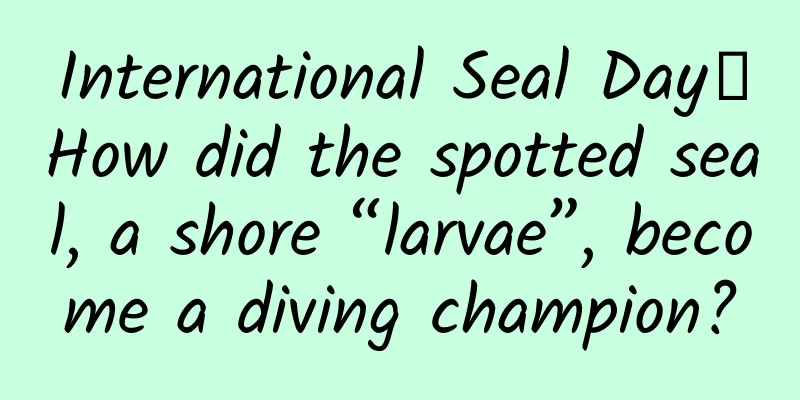International Seal Day丨How did the spotted seal, a shore “larvae”, become a diving champion?

|
March 1st of every year is "International Seal Day". The establishment of this international theme day aims to arouse human attention to the living environment of seals and marine ecological issues. There lives a group of cute and adorable marine mammals in the Yellow Sea and Bohai Sea of my country. It is a national first-class protected animal, the Western Pacific spotted seal, which is known as the "Pearl of the Bohai Sea"! The spotted seal is a fat and sturdy creature with a rounded front body and a spindle shape. It is called the "giant panda of the sea" for its cute appearance. It is a pinniped marine mammal that lives in the coastal areas of temperate and cold temperate zones. It is mainly distributed in the Bohai Sea and the northern Yellow Sea in my country. It is the "flagship" species of the marine ecology of the Yellow Sea and Bohai Sea in China. In the process of evolution, the limbs of the harbor seal gradually formed a structure shaped like a fish fin, which can help it move better on land and in water. Although it moves clumsily on land and can only rely on the peristalsis of its forelimbs and upper body, once it dives into the water, the muscle valves in its nostrils and ear holes will immediately close to prevent seawater from pouring into its ears and nose. They are veritable "swimmers and divers". They can stay underwater for about 70 minutes and often dive to 400-500 meters or even deeper. All of this depends mainly on sufficient oxygen, and harbor seals have three main ways to store oxygen: 1. Store oxygen in the blood. 2. Using its obese body to store oxygen, the respiratory pigments contained in the muscles of spotted seals are many times higher than those of terrestrial animals, and the oxygen storage capacity can account for about 50% of the total body oxygen storage capacity. 3. Save oxygen by holding your breath and slowing down your heartbeat. Due to illegal hunting, marine development and overfishing, the living environment of spotted seals is threatened. Spotted seals are the only pinnipeds that breed in my country. Once they leave the Yellow Sea and Bohai Sea, China will no longer have resident pinnipeds. Therefore, the task of protecting spotted seals is imminent! March 1st of every year is International Seal Day. We hereby call on everyone to protect the marine environment and resources, cherish and protect marine life, and retain the precious "giant panda of the sea" - the Western Pacific spotted seal. |
<<: Attention! Vitamin B3 may increase the risk of heart disease and stroke, don’t take it blindly!
>>: As we advance deeper into space, what should we do if we encounter a fire?
Recommend
Do you blow on a paper airplane before it takes off?
Paper airplanes are toys we often played with whe...
What are the effects of Huangweizi?
Gardenia jasminoides is a common Chinese herbal m...
Is it harmful to discharge nuclear waste water into the sea? You need to know what nuclear waste water is first
Is nuclear waste water harmful? This question its...
The efficacy and function of sweet tea
The medical value of sweet tea is beyond our imag...
You may only live for 5 years in your life, and spend 3.75 years sleeping! Are you crazy envious, or are you impressed?
This article was reviewed by Lin Zhideng, PhD in ...
Effect of washing hair with water boiled with Ligustrum lucidum
Most of us may not know much about Houttuynia cor...
What are the benefits of horsetail grass?
Many people may not know much about horsetail gra...
Delicious fruits that are on the market recently can be eaten to control sugar and lose weight! Except for two situations...
Now is the time when plums are on the market in l...
The efficacy and function of coconut root
Coconut root is something that many people are ve...
The efficacy and function of Huishi
The Chinese herbal medicine Hui Shi is a relative...
Can I drink American ginseng after drinking alcohol?
American ginseng is a very popular medicinal herb...
Purple Sulfur Bacteria—The First Alien Lifeform Discovered?
Bacteria - the absolute overlord of time In an ep...
Can pine pollen cure kidney disease?
Pine pollen is a very valuable health product wit...
Will the novel coronavirus break out again after the May Day holiday? Does the new virus strain cause conjunctivitis? One article explains it all!
From the surge in the number of positive COVID-19...
From WAVE SUMMIT+2021, we are looking for the indispensable “gaze” of the new generation of AI people
When we talk about AI, we always associate it wit...









